So you’ve been invited to go and stay on someone’s boat? Awesome! The next best thing to having a boat of your own is having friends who have boats. It is much cheaper and just about as much fun.
So to increase your chances of having a fantastic time – and being invited to come back and stay again, here are my top tips for being a good boat guest:
1. Adjust your Expectations
If you haven’t stayed on your friends boat before, and you are imagining that it is going to be similar to a luxury cruise, then you are probably going to be a bit disappointed. Expect the trip to be something more along the lines of a camping trip on a boat and then you are hopefully going to be really impressed. This is all to do with expectations vs reality.

2. Have a Plan B
If you are travelling to meet your friends in another part of the country or the world, then it pays to have a backup plan.
Most sailors routines are dictated by the weather, if the wind doesn’t blow in the right direction, blows too hard, or not at all, or perhaps a vital bit of the boat breaks down for example, anything could happen that might prevent the boat from being in the right place at the agreed time. Your holiday dates might be set to line up with your annual leave from work, or school holidays. What are you going to do if the boat isn’t in the place where you arranged to meet up? You will need to be flexible, and this could entail you either delaying your trip, changing your destination entirely, or just deciding to go anyway and stay in a hotel instead.
Having a good travel agent is a great idea for this kind of thing. You can then call them up from wherever you end up in the world and get them to do the donkey work and either book you on another flight, bus or ferry to get you to the boat, or in to a hotel to relax there instead.
Rest assured, your friends will be feeling terrible, so don’t take it out on them, and appreciate that this trip is more of an adventure then a scheduled regular holiday. If this sounds a bit uncertain and you would rather have some more concrete plans, why not book yourself in to a nice sea side resort and ask your friends to come and meet you there instead? That way it won’t be so much of a drama if they don’t get there and you will still get a nice break.
Before you travel, make sure you check the immigration requirements of the country you are visiting, particularly if you are flying in and then sailing out to another destination. Many places require you to either have a return ticket or a letter from the Captain of the boat you are sailing on confirming your plans. The same applies with the country you are arriving in to.
3. Let’s get packing!
But before you do – have a look at your bag. Space is at a premium on most boats, and there usually isn’t going to be anywhere for you to store a large suitcase. Soft bags are definitely the way to go. Imagine that there is a possibility that you might have to sleep next to the bag – (as this is what our guests currently have to do on Wildy)
Bear in mind that you are possibly going to have to walk with it for a long distance up and down marina pontoons or in and out of dinghies and there may not be any trolleys available, so a soft bag with wheels like this one or a back pack or small duffle bag is the best thing to take.
Inside your bag, I can highly recommend packing cells. These are like a fabric chest of drawers, and if you do have the luxury of being able to unpack your bag in to a locker of some kind, then you can simply put the packing cells in the locker and everything is kept all neat and tidy.
Remember that it is unlikely that you will have a washing machine on board the boat, so while you want to pack light, make sure you pack smart!
A day pack is another essential item for when you head ashore. Here are some tips of things you might like to consider bringing in your day-pack. Having a backpack means your hands are free for climbing in and out of the dinghy.
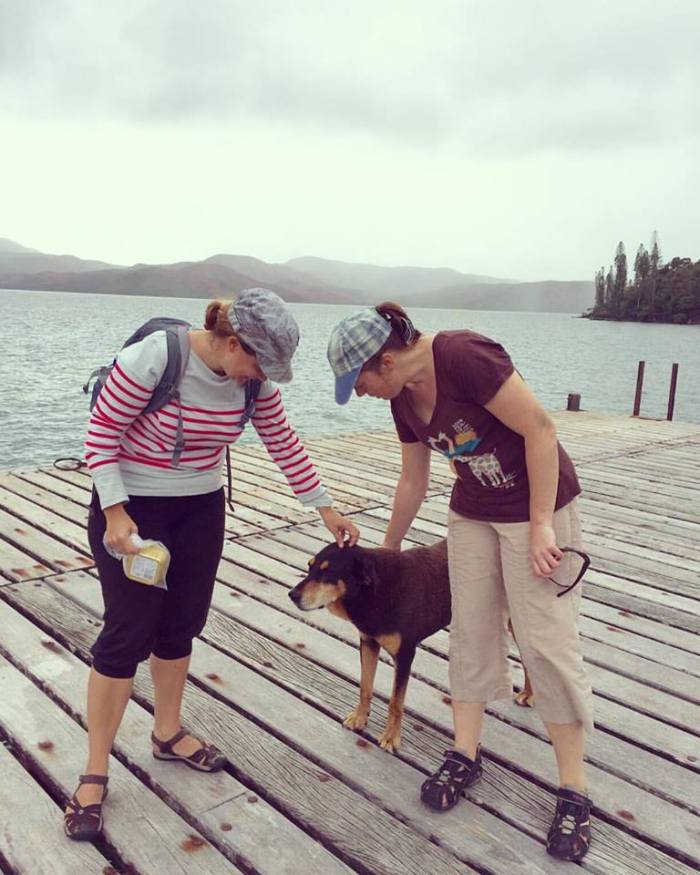
4. Expect to get wet
It is a boat, and therefore surrounded by water. You are going to get wet. If it isn’t raining, then a wave can splash you, and your stuff – including your phone and other precious things.
Pack decent dry bags and store anything important, including your passport, in them.
Getting in and out of the dinghy is also a sure way of getting soaked. So make sure you bring a light waterproof jacket and some shoes you don’t mind getting wet. You will get a wet bum no matter how hard you try not to. Quick drying clothes are better than say denim jeans. Anything you put on the floor of the dinghy will also get wet and probably sandy. I can’t rave enough about my Keen sandals. You can easily jump out of the dinghy and in to the water without being afraid of stepping on something sharp, and then up the beach and off on a hike. Shorts are easier than skirts when you are climbing over life-lines or down ladders – trust me!
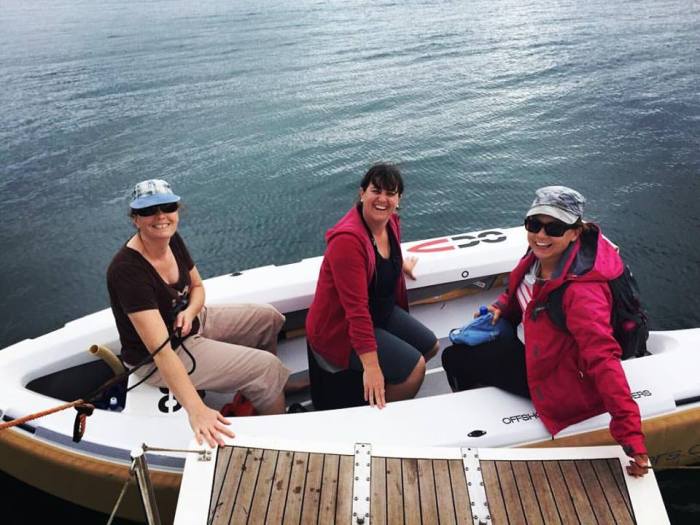
5. What else should you bring?
This will of course vary considerably depending on where in the world you are heading to but here are some suggestions:
- A life jacket? – Most boats will have life jackets for all the crew, but best to ask and if you prefer to wear your own, then by all means bring it along. If it is an inflatable lifejacket then carry it in your hand luggage or check with the airline before flying. Some security checks in certain countries don’t like the gas canisters. If you have your own sailing gloves and harness you might like to bring them too. (Especially if you are doing any offshore passages)
- Turkish Towels – these are light weight, fast drying and great for travelling. Bring one for the shower and one for the beach.
- Your camera & GoPro
- Notebook or iPad for writing a diary of your trip.
- Sleeping bag or sheets? Check with your host about what is best in this situation as they might be able to accommodate this without you bringing anything. The idea is that you don’t want to leave your hosts with a mountain of washing when you leave.
- Swimming & snorkelling gear – you might not have room for your fins as well, but a mask and a snorkel is a good start.
- A torch – headlamps like this one are brilliant. They are rechargeable, waterproof and have a white and a red light. The red light means you can see in the dark without destroying your night vision.
- Some sensible pyjamas – I don’t think I will ever forget the sight of my friend Vic as I was assisting her wrestling with the mooring lines in a storm while she was wearing a very short blue silky nighty…
- A book, magazines or a Kindle. Here are some sailing book suggestions to get you in to the mood.
- Music/Pod casts & earphones
- Earplugs – boats are noisy and there are lots of things to keep you awake all night.
- Any medication you might need.
- Sunscreen, insect repellent
- Snacks
- Hat & sunglasses – polarised are best.
- Baby wipes – heaven when you can’t have a shower
- Sanitary items. These can be expensive and difficult to obtain in some places around the world. (Remember not to flush them down the loo – refer to paragraph 8!)
- Enough clothes so that you don’t have to be visiting a laundry on a regular basis. Bear in mind that it is OK to wear the same thing twice on a boat, but on the other hand you don’t want to end up with everything being wet and have nothing to wear. It can get cold at nights even in tropical places, so bring warm things too. Something nice for dinners ashore. Your host can guide you on this depending on the destination. When going ashore, remember that some places require you to dress modestly, covering your shoulders and knees, particularly if visiting churches or temples, so pack something for those trips as well.
- Ask your hosts if you can bring anything from home for them – boat parts, marmite, rum, that kind of thing is always handy particularly when they are difficult to obtain overseas.
5a. What NOT to bring
- Hair dryer, hair straighteners – refer below regarding the power problems, but that aside, you are on a boat, it’s windy, your hair is going to be messy. Everyone’s hair is going to be messy – it is going to be OK… bring hair ties – pony tails are your friend!
- High heels – yes they look fantastic, but no, they aren’t going to be much use on the boat unless you want to break your neck, puncture the dinghy and ruin your heels in the gaps of the wharf.
- Shoes with marking soles – don’t be offended if your host asks you to not wear footwear at all while on the boat. The idea is to try and avoid having to clean up too much, so sandy, dirty and marking footwear might all end up in a bucket only to be used when you go ashore.
- Lots of dressy clothes & jewellery – you might go out for dinner or to a beach bar, but it is unlikely that you are going to need a suit or lots of fancy things to wear.
- Anything you REALLY don’t want to get wet.
- Problems – chances are your hosts don’t really want to play therapist – we are all here to have fun!

6. Power possibilities
Unless you are parked up in a marina and plugged in to the shore power, or are on a big boat with a generator, it is entirely possible that running any electrical devices and charging things is going to be a bit difficult.
Boats run on batteries, and these are charged either by solar, wind or motor power. There are lots of important things that need to run off the batteries – like lights, fridges, navigation systems, auto-helms and that kind of thing. So it is best not to expect to be able to run a hair dryer or charge up your laptop whenever you feel like it.
The best thing to do is arrive with all your vital electronic things fully charged before you get to the boat, switch things off completely when you aren’t using them (particularly the lights in your cabin), ask your host before plugging something in to charge, and maybe bring along a solar powered portable power pack for charging up your phone without having to plug in to boat power.
Bring an adapter plug so that you can also charge things up when you go to shore in a cafe or a bar for example.
Switch off lights if you are not using them, or better still bring your own Luci lights. These are super cool solar powered inflatable floating lanterns. I love them! They make a great gift for your host too.
7. The Shower Situation
As with the power, once you leave the marina and cast off the lines of unlimited power and water supplies, you are on your own! Water that flows so freely from taps on the land all of a sudden becomes a precious resource.
Therefore it is unlikely that you are going to be able to have 20 minute long showers every day. Remember the first paragraph about camping? Some boats (like Wildy) may not have a shower at all, and you might be lucky to have something along the lines of a weed sprayer shower like this one.
So best to be prepared for this. Bring along a couple of packs of baby wipes or a flannel, which are a fantastic alternative for a shower when you want to freshen up! Have a swim, and if you are in a marina, or near a resort that will allow it, then head ashore for a wash.
If you are lucky enough to have a boat with a shower AND hot water, then keep it short. Don’t be the person that uses ALL the hot water and leave none for anyone else. If you have long hair, then brush it (outside) before you get in to save having hair getting stuck in the pump that puts the water from the shower back outside. If you are really rationing, then wet yourself first, then turn the water off while you lather up, then back on again for a final rinse.
Turn the tap off while you brush your teeth, and the same applies when washing the dishes. The last thing you want to do is to run out of water and have to cut the fun short while you head back to reality to load up with more.
Of course if the idea of not showering and blow drying your hair every day completely freaks you out, then you might be better back at the resort ashore, and getting your friends to come and meet you for day trips instead.
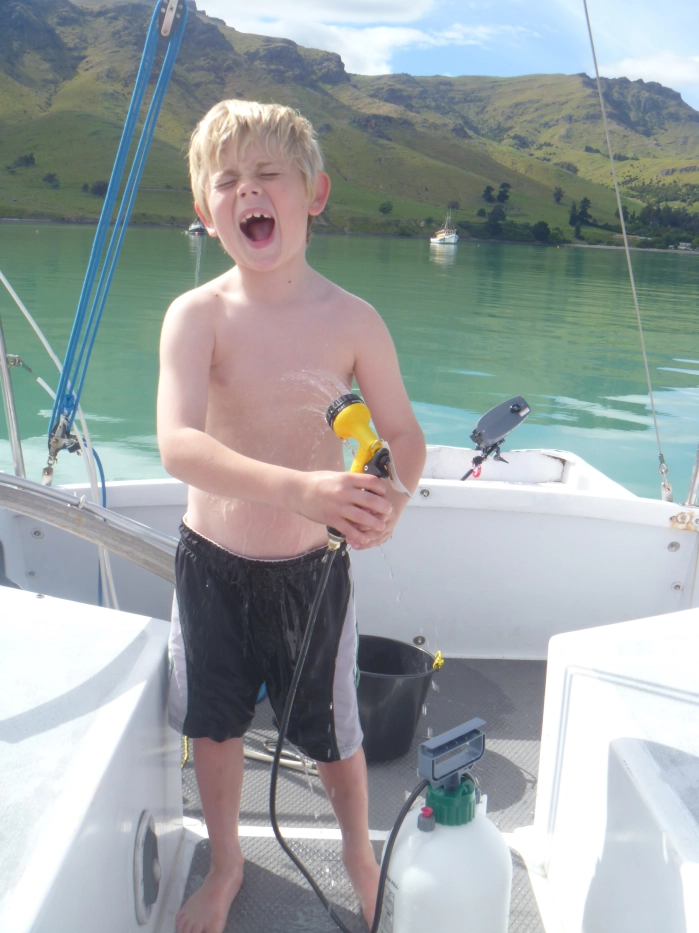
8. What about the loo…?
While we are on the subject of ablutions, then we had better talk about the ‘head’. Apparently it is named the head as the toilets were usually placed at the front or head of the boat. Not usually the case these days, but the name has stayed.
Boat toilets are interesting and delicate things. They do not operate like toilets on land, and I would highly recommend getting your host to give you a hands on practical demonstration of how to operate it BEFORE you actually use it. (Just trust me on that one ok…?)
Some key things you need to know are as follows:
- if you block the loo then you are going to be the one who has to fix it. This is not a pleasant job…!
- Do everything you can to avoid blocking the loo. Toilets do not like any foreign objects, particularly things like hair, baby wipes, tampons, that kind of thing. The toilet has a thing called a macerator, which is like a waste disposal unit that munches up everything that goes down there in to little bits. This is the thing that usually gets blocked. Bear that in mind before you put ANYTHING in the toilet…
- Some people do not even flush toilet paper down their loos, but your hosts will advise you about that. Be frugal with the toilet paper, as this is the major cause of the blockages… and if you run out, then its often a long trip to the supermarket to buy more.
- Boats usually have a holding tank to store the waste, this is then either pumped out at a marina or disposed of over the side when you are far enough away from shore. It pays to keep a close eye on how full the holding tank is, before it gets to 110% capacity… My friend Craig has a good story about that…
- There are usually two seacocks (openings in the hull under the water) that need to be switched on for a boat toilet to work. One is for sucking the sea water in for flushing, and the other is for when the waste goes over the side. Do not attempt to operate the toilet without these seacocks being open – your host will advise you on this.
- Going to the loo when it is really rough is very difficult! See here.
Anyway the best thing is not to be embarrassed by the toilet thing on a boat. Let everyone know if you want some privacy, turn on some music if you don’t want anyone to hear you. And make sure you get some good instructions on how to use it properly – you will be fine!
9. Will you get Seasick?
Being seasick can be a nightmare for you and for your hosts. Everyone is different, but if you are going to be sailing anywhere outside a protected harbour, then you should pack some seasickness medication to take with you.
Preferably take it before you start the passage as it takes a wee while to absorb in to your system. I prefer Stugeron which you can’t buy in New Zealand, so I get it from an online pharmacy from the UK. It is the only thing I have tried that doesn’t make me really sleepy.
Remember that if you are sailing, the boat is going to be heeling over. This is fine and is what the boat is designed to do. However everything that you leave on a flat surface will find its way on to the floor. Stow things away in a safe place, lock the cupboards, don’t leave things laying on the table etc.
Being on a boat requires a reasonable amount of physical fitness. Climbing up and down ladders, in and out of dinghies, balancing when it gets rough, if you are unsteady on your feet or if you don’t like the water, you might be happier on dry land. Book the resort and catch up with your friends on dry land.
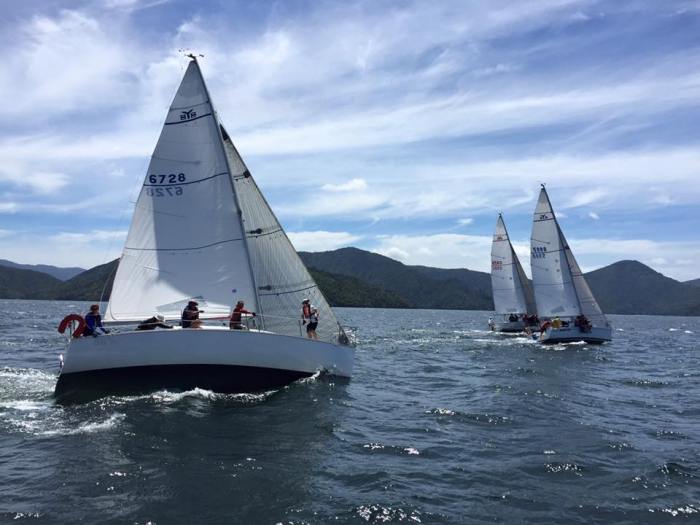
10. How long should I stay?
This is a hard one and everyone will be different. The last thing you want to do is overstay your welcome.
Your hosts might be gracious and agree to you coming for weeks at a time, but just remember you are all in a very small space with people who are used to being alone most of the time, it is easy to start annoying someone without even realising it.
On the other hand, they might love the extra company and assistance and want you to stay for longer.
Try to be helpful and easy-going, try and give people some space, which can be hard to do on a small boat. If you don’t know about sailing, then do your bit by cleaning and cooking or fixing things instead.
Aim to keep all your things tidily away in your cabin. It is annoying having to constantly pick up after people.
If you drink lots of wine or beer, or like to eat particular things, then be sure to bring enough along for you to consume and to share with everyone else as well. If you are gluten free, dairy free or allergic to something, let your host know in advance. Sometimes special dietary requirements can be difficult to cater for in anything other than major centres with large supermarkets. Don’t automatically assume that your special diet will be able to be catered for. If this is going to be an issue – bring your own.
Aim to not be a burden. If you break or lose something then make sure you repair or replace it.
If you are smoker, you might want to check with your hosts before you travel how they feel about you smoking on board. If they are OK with it, remember that there are plenty of flammable things on board a boat including outboard engine fuel, sails etc. Be careful with those cigarette butts and lighters.
If you want to bring a gift for your host, remember that space is at a premium, and practical things that are non-breakable and waterproof tend to be more useful. Here are some suggestions on gift ideas for sailors.
The other option is to charter a boat of your own, and go sailing and raft up together. That way you can have your own independence, but still enjoy spending time together.
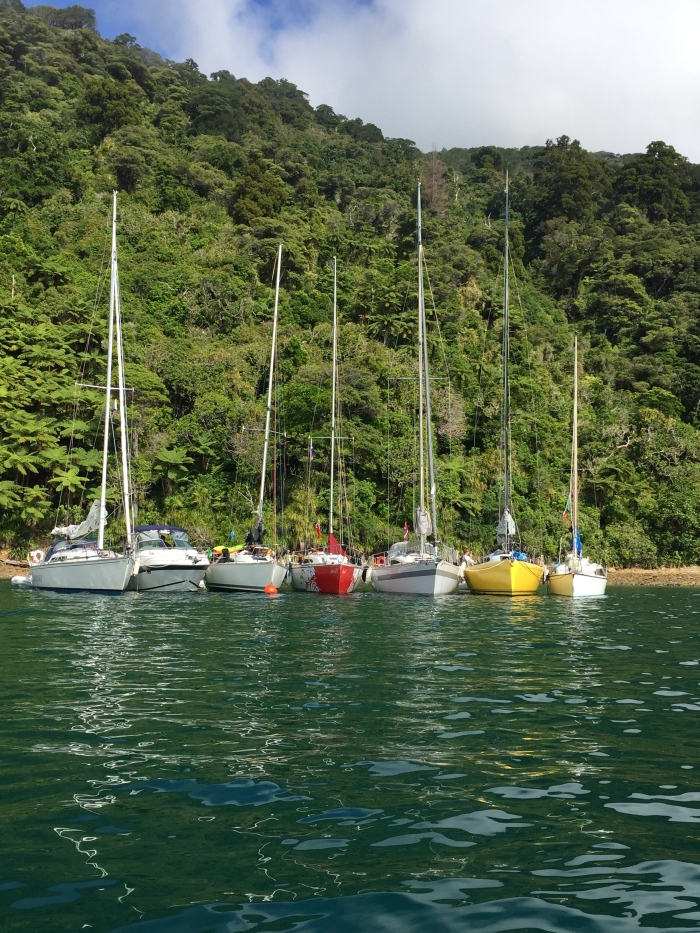
11. What about the Money?
Don’t assume that because your friends live on a boat that they are millionaires. They are probably living on a tight budget, and so you should expect to pay your way.
The easiest way we have found to share the costs of being on a boat are to either have a boat kitty – where everyone deposits the same amount of cash in to a separate wallet and then this is used to pay for things like groceries, marina fees, excursions, eating out etc.
Alternatively if you are just going away for a short time with a group of friends, we draw straws on who is going to cook which meals. Then that person is in charge of providing all the ingredients and cooking for everyone for that particular meal. This saves a lot on over catering when travelling with a group.
Some more travel money tips can be found here.
12. Safety
The skipper will probably give you a safety briefing when you come on board. There are plenty of things on a boat that are dangerous, but the things you should ask about include:
- Lifejackets & harnesses – location, how to use them, and when should they be worn
- The whereabouts of the fire extinguishers
- Any hazards – particularly the boom, the safe operation of winches, not putting any body parts between the boat and any other solid objects etc
- How to use the VHF radio to call for help
- How to start the motor (very handy if the skipper falls overboard)
- The location of the life raft
- The safe operation of the stove and how to turn the gas on and off
- The location of the first aid kit
Tell your host if you are on any special medication, where you keep it and how much you take. Then if there is any kind of accident, and you end up in hospital or whatever, they can make sure that this information and medication goes with you.
If you don’t know how to use something or what to do, ask first before touching. All boats have their own ways of operating, and doing something incorrectly can possibly have a bad result.
Also it is always good practice when going out on a boat to let someone know at home where you are going, the name of the boat you are on, who you are with (and their contact details – satellite phone number for example) and when you are expected back.
13. Communications
It is unlikely that the boat is going to have wifi. If you are in a marina, or in a cafe or bar ashore then sometimes you might be able to access it. The best option is to check with your phone provider before you leave the country and see how much international data roaming is going to cost. In New Caledonia it was NZD$30.00 for just 5MB of data. That was enough to download one weather forecast…
If you do have the luxury of wifi, remember that it probably isn’t unlimited or is costing your hosts to have it, so check first and if that is the case try to use it frugally.
The new InReach Explorer is a very cool device that can send and receive text messages via satellite. It can also be used as a Personal Locator Beacon, obtain weather forecasts, track and share your location as well as many more cool features. A great tool if you are going to be out of phone coverage for a long time.
14. When you leave
With any luck you have had a fantastic time, great weather, visited some amazing places, met lots of interesting people and you are keen to come back and do it all again. So how do you increase your chances of getting a return invitation?
- Give yourself plenty of time for flight connections. As with paragraph 2, there can be a multitude of reasons why you will miss your plane. Sailors hate sailing to a schedule, particularly one that puts the boat (and everyone on board) in danger. Consider booking a flexible ticket that allows for date changes.
- Leave your cabin nice and tidy. Offer to do or pay for the washing of any linen you have used, sweep the floor, check under the mattress and in the lockers to make sure you haven’t left anything behind.
- Clean the kitchen/bathroom/toilet – make an effort to leave the place as you found it or tidier than when you arrived.
- If you are coming in to a marina, help with filling up with more water, offer to pay for the fuel, help wash the boat down etc.
- Arrange to repair or replace anything you accidentally lost or broke. Insist that you pay even if your hosts tell you that it’s OK. Winch handles are a great example – these can cost over NZD$100 to replace. Yes it was an accident that you dropped it, but don’t make others have to pay for things that you lose.
- Replace any wine/beer/spirits you drank or buy some extra as a thank you to your hosts
- Send a message when you get home thanking them and saying what an amazing time you had.
- Share or tag them in any photos you took on Facebook (better than emailing them if they don’t have great wifi)
So there you have it! Hopefully with those tips you are well on your way to having a fantastic sailing holiday with your lovely friends and you get invited back again next year.
If you have any other tips for visitors and being a good (or bad) guest, please add them in the comments below.
Many thanks to WWS – Kristine, Barbara, Deb, Lea, Donna, Nancy, Dawna, and Virginia for their extra tips that I have added on to this post. Also here is a link to the instructions Denali Rose and Burnetts Ahoy give to their visitors.
As an Amazon Associate I earn from qualifying purchases at no extra cost to you. Thank you for your support.



Great advice for visitors… I have my mum visiting in a week, I will send her your link!
LikeLiked by 1 person
Some sound advice here Vicky. On the subject of money, it is worth knowing that there are some smartphone apps that can help with recording who paid for what, and determining who owes who and how much at the end of a sailing or any other event. One free app that I have used recently and can personally recommend is an Android app called “Settle Up” by David ‘Destil’ Vavra; this particular app can be used by more than one crew member (sharing when data connection allows) and can also deal with situations where some expenses were only for the benefit of some of the participants. Finally, although I haven’t tried this, I understand it can also integrate with Paypal.
LikeLiked by 3 people
Wow cool thanks for the tip. I will look it up 🙂
LikeLike
Brilliant! I just sat down and started writing Rules&Guidance to crewing/sailing/being a guest on Acedia! Guidance and establishing expectations are key.
LikeLiked by 1 person
This is an excellent read. I couldn’t have out it better myself. Is it OK if I reblog this?
LikeLiked by 1 person
Of course! I’d be honored 🙂
LikeLike
I thought this was an excellent piece of advice, having been both a novice sailing guest and later a host on our own boat, we should all circulate this! So may I reblog this too? Of course as the designer of the Habitent our guests very rarely get wet when on board, when we are moored. It’s an essential piece of equipment – really! Well done.
LikeLiked by 1 person
Of course Christine, I would be honoured for you to reblog. I have just checked out your Habitent website as well – looks great! 🙂
LikeLike
Great article and having guests on board can be a delight or a horror (we’ve experienced both!). We have friends who have ‘rules/information’ printed out (similar to your article) and they give this to their guests.
1) We’ve had guests that we told all the above and they are surprised when we have little power (they didn’t believe half of it!
2) We’ve had guests where they are very happy to let us cook, wash up and pay for everything – they think the boat runs on air.
3) We’ve had one guest comment on a tie up place with “this is horrible, let’s go somewhere nice!” We were tying to a pretty bank in a village in France (doing the canals) – a storm had just come in!
4) On the plus side we’ve had guests that are delighted to cook (and teach me some tricks) and understand living on a boat full time does not mean we are rich!
LikeLiked by 2 people
the “printed information beforehand” is something I found very useful as well (both as a guest in my early sailing days as well as being the skipper). The main topics from Viki’s post are excellent for this printout, plus some boat specific additional information (which important stuff can be found where) might prevent quite a few misunderstandings.
LikeLiked by 1 person
Great pointers on being a guest aboard! One thing I’d add on the subject of travel and life jackets: if you’re going by air, many airlines will not allow you to bring a compressed gas aboard – not even in checked baggage, so an inflatable PFD will have to go without, leaving it nonfunctional. We discovered that on our honeymoon in 2012, flying USA to BVI. Those cylinders aren’t cheap, and aren’t available many places, so we were out of luck on two counts.
LikeLiked by 1 person
Reblogged this on Third Time Lucky! and commented:
I have reblogged this great post, as it gives some excellent advice for anyone thinking of joining friends or relatives to go sailing. Well worth a read……
LikeLike
Good article Viki!
LikeLike
great informative post! I’ll share this with all my peeps hoping to go sailing soon.
Thanks!
LikeLike
Thanks Jill! 🙂
LikeLiked by 1 person
Pingback: Want to Go Sailing But Don’t Have a Boat? | Capt Jills Journeys
Pingback: Want to Go Sailing But Don’t Have a Boat? | Captain Jills Journeys
Great advice, Viki!
Stephanie @ SV CAMBRIA
LikeLike
This is great, wish I’d seen it before our last guests arrived!
LikeLike
Great blog post about being a good guest, some terrific advice here! Thanks for the shout-out to our blog, I love to share my world, and I love to have comments posted. AND so far, I have loved our guests!
Donna/Denali Rose
LikeLiked by 1 person
Spot on Viki, I think I will post this advice out to friends before they come out.
Meeting someone for us at a time and place is always difficult but we have had guests who expected us to pay for everything including their meals out, brought two huge suitcases for a couple of days stay and who blocked the toilet with baby wipes. (3 days and a lot of money to fix).
My top tip for skippers is that when guests won’t get back on the boat and just want to swim but you need to sail then take some toilet paper, put brown sauce on it or peanut butter and throw it in the water near them when they are not watching. They climb aboard very quickly for some reason.
Excellent post.
LikeLiked by 2 people
Lol – great advice! 😉
LikeLike
We’re visiting friends on their Caliber in a couple of weeks, and appreciate the advice! Looking forward to a Caribbean ‘camping’ trip!
LikeLike
Have a wonderful time! 🙂
LikeLike
Pingback: What to expect and how to be a good boat guest – Salty Toes
Pingback: Crew Wanted/Available Tips | Little Ship Club Canterbury
Pingback: Writing a Sailing Resumé | Astrolabe Sailing
Pingback: Welcome Aboard…A Primer For Guests: – Live Free 2 Sail Fast